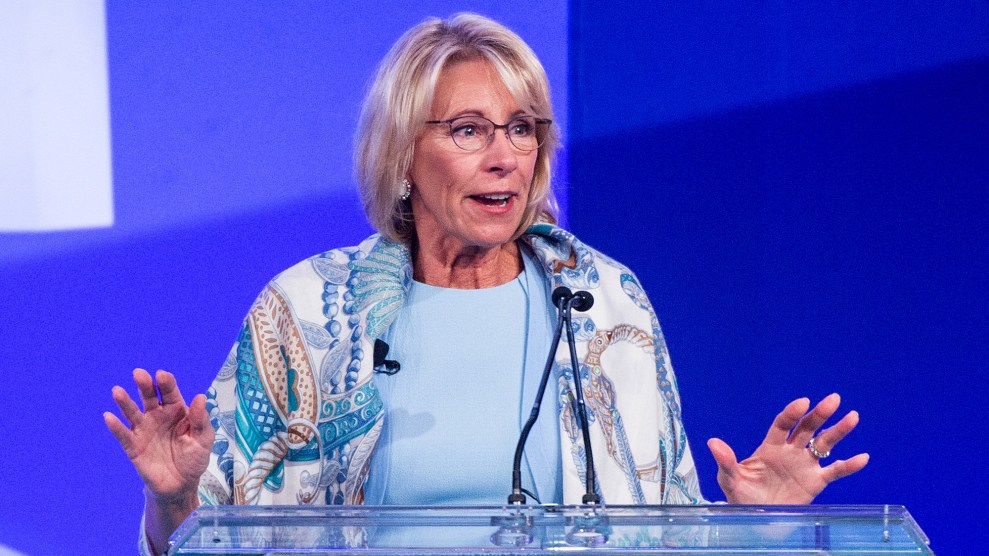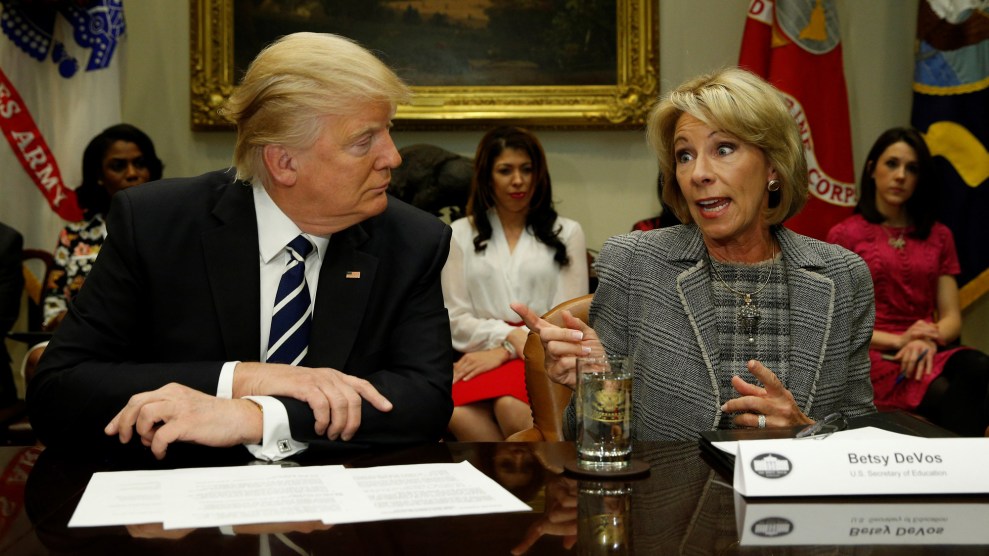
Education Secrectary Betsy DeVos speaks in Utah on Tuesday. Leah Hogsten/The Salt Lake Tribune/AP
Even before she took over as education secretary, Betsy DeVos was the subject of protests and called a threat to public education. Now, as she prepares to give the commencement address at Bethune-Cookman University on Wednesday, opponents angry over her previous comments about historically black colleges and universities are demanding her removal as speaker.
On May 1, school president Edwin O. Jackson tapped DeVos to give the graduation speech and receive an honorary degree from the historically black university. A university statement likened DeVos’ commitment to education to that of its founder, Dr. Mary McLeod Bethune. “The legacy of Dr. Bethune is that she was not constrained by political ideology, but worked across all parties to support B-CU,” Jackson said in the statement. (The university later clarified the comparison on Twitter, noting that “there are similarities in everyone” and that “we must find common ground amongst each other.”)
The announcement sparked demonstrations last week from current students, alumni, and civil rights leaders, who haven’t forgotten DeVos’ February comments praising HBCUs as “real pioneers when it comes to school choice.” As many critics were quick to point out, historically black colleges and universities arose after prospective black students were denied admission to white institutions as a result of state-sanctioned segregation. The comment was reminiscent of DeVos’ underwhelming performance during her Senate confirmation hearing and, when paired with her outspoken support of vouchers and charter schools, has led critics to question both her job qualifications and her commitment to public education.
Shortly after Bethune-Cookman announced that DeVos would speak at commencement, Florida NAACP chapter president Adora Obi Nweze asked the university to rescind its offer. “What makes the Bethune-Cookman University approach unusual,” Nweze said, “is their plan to honor a person who has been on the job less than 100 days and has no record of advancing educational equity for all students.” Even Dr. Bethune’s granddaughter objected to DeVos’ appearance, telling the Associated Press the controversy diverted attention away from the graduation itself.
Jackson defended the invitation in a letter to the school community, noting: “I am of the belief that it does not benefit our students to suppress voices that we disagree with, or to limit students to only those perspectives that are broadly sanctioned by a specific community.”
But Jackson’s call for free speech didn’t square with Nweze’s claims this week that the school threatened to silence faculty members and to withhold degrees and fine students “for freedom of expression.” That led the NAACP chapter to call for the resignations of Jackson and university board chairman Dr. Joe Petrock “effective immediately.” (The university said in a statement that the president and the administration “have not and will not seek to chill the free speech of our students and faculty.”)
In a last-ditch effort Tuesday to stop DeVos’ appearance, opponents presented the university with petitions signed by roughly 60,000 people that call for her removal as commencement speaker. And it probably isn’t going to end there: Protests are expected to take place outside the event.
Watch some of DeVos’ speech below:








